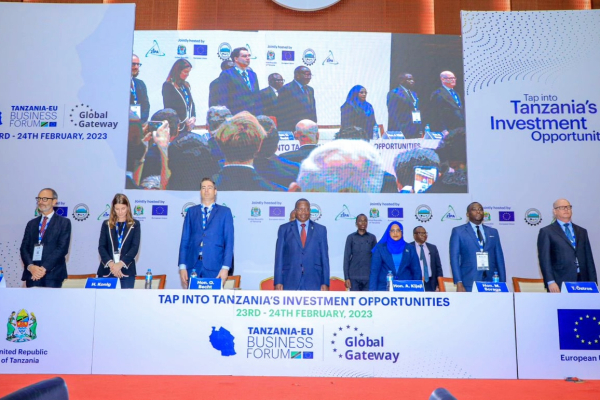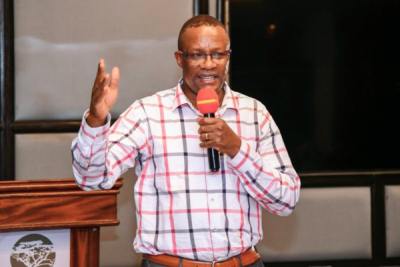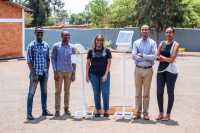
News (1795)
The fund aims to support women in their bid to advance tech innovation in Africa where they still face significant access to finance challenges.
Last Monday, the Women in Innovation Fund (WiNFUND), a nonprofit accelerator supporting women-led and women-focused businesses, announced the public launch of the WiNFUND NFT Africa Collection, a collection of unique digital artworks designed by Rwandan artist Christella Bijou.
The fund, launched in 2022, also disclosed its aims. “WiNFUND is an innovative model that will help entrepreneurs grow by building an engaged, global community that will provide business support and financing through the sale of unique NFTs,” said Patricia O'Hayer, co-founder of WiNFUND.
Co-founded by consumer goods company Reckitt, the Health Innovation and Investment Exchange (HIEx), Kofi Annan Foundation, and the Ecobank Foundation, it aims to address two major inequalities, namely women’s uneven access to essential health care and finance.
It will be partly financed by the sale of WiNFUND NFT while WiNFUND NFT holders will have access to invitation-only events on the Sustainable Development Goals and will be invited to join a mentoring program to directly support successful women entrepreneurs.
In the second half of 2022, it opened applications for women entrepreneurs seeking its support. Up to now, it has received 300 applications from seven African countries. The applicants shortlisted will receive business support to help them grow, while the best will receive direct funding from WiNFUND.
Samira Njoya
In Tanzania, the ICT sector is growing rapidly. But, to quicken the pace of growth, authorities want to attract foreign entrepreneurs.
Tanzanian Vice President Philip Mpango recently invited investors from around the world to explore and invest in Tanzania's ICT and digital transformation sector.
On Thursday, February 23, while opening the first Tanzania-European Union (EU) Business Forum in Dar es Salaam, he praised his country’s digital sector while reminding investors that the country's national ICT policy supports investments in digital infrastructure such as data centers and digital technology institutes.
"ICT and digital transformation are among the key drivers of rapid development...This is aimed at improving skills and leveraging cutting-edge digital innovations such as robotic engineering and artificial intelligence," he said before adding that the Tanzanian government was focused on building a dynamic economy based on four pillars, namely reform, reconciliation, resilience, and reconstruction.
To pave the way for domestic and international investors, the government has taken steps to strengthen and modernize the sector, including the establishment of the Tanzania Investment Centre and the Zanzibar Investment Promotion Authority. The centers are intended as one-stop shops for investment promotion and facilitation.
Attracting investments is just one of the actions being implemented by the Tanzanian government to develop the ICT sector. In October, the government inaugurated a $3.4 million infrastructure package. The infrastructures covered include 11 ICT centers in the 11 districts of Unguja and Pemba, the two main islands forming the Zanzibar archipelago, as well as 42 communication towers across the archipelago.
Samira Njoya
A few months ago, Tunisia kicked off the digitalization of its public services. The aims were, among others, to end unnecessary bureaucracy and guarantee the quality and efficiency required for the services.
Tunisia’s mobile ID project will target over 100,000 citizens this year, ICT Minister Nizar Ben Néji indicated last Friday.
During a campaign aimed at raising awareness of the benefits of mobile ID, the official explained that his ministry was working to reach more than 100,000 Tunisians this year and increase the number to the thousands in the years to come.
"The Ministry is working with banks to introduce mobile IDs in the banking sector,” he said pointing at the upcoming introduction of electronic contracts in car sales and purchase procedures.
The country launched its Mobile ID service on August 3, 2022. The ID was introduced as a universal and unique authentication method to access some public services online. The aim is to gradually replace cumbersome administrative procedures with digitized, simple, and fairly secure procedures.
Earlier this year, the official website dedicated to digital identity in Tunisia announced that as of Monday, January 2, 2023, the number of applications for digital identity not activated had reached 86,000 while the number of digital identities activated was 36,474. For the Minister of ICT, this is a good start. However, the country wants to generalize the use of the mobile ID and introduce other online services, in cooperation with other ministries. Hence the awareness campaign.
Samira Njoya
In sub-Saharan Africa, the chronic absence of civil servants tends to undermine many institutions. To address this growing phenomenon, governments are turning to digital technologies to provide adequate solutions.
The Gambia recently called on ministries, departments, and agencies to install biometric tallying systems to confirm the presence of civil servants at work. According to a memo issued by The Gambia's Ministry of Public Service, Administrative Reforms, Policy Coordination, and Implementation, the call is merely a reiteration of an earlier memo issued by the Secretary-General and Head of the Public Service in February 2021.
The memo instructs the concerned institutions to acquire and install the biometric attendance system, per the specifications, by the end of February 2023.
Recently in Kenya, the Nairobi County government made a similar decision. It announced that it would introduce a digital employee registration system and biometric identity cards to identify "ghost" employees at the town hall.
Johnson Sakaja, the governor of Nairobi, said the county had budgeted Ksh10 million ($79,000) for the project, which will identify irregular workers among the approximately 13,000 civil servants working for the city council.
Meanwhile, in Gambia, the government plans to replace ID cards with an electronic biometric tallying system, with data to be printed weekly and transmitted monthly to the secretary general and head of the civil service.
The new reforms aim to combat the ills that plague the sector (including absenteeism), modernize the administration, and reduce the huge wage bill that ghost workers impose on the government.
Samira Njoya
The Egyptian government has made citizen-centric digital transformation a key factor in its development. To achieve its goals, it has increased investment in the ICT sector.
Egyptian President Abdel Fattah al-Sissi (photo, center) recently called on his government to provide all necessary support to build and develop the skills of Egypt's youth, support start-ups and encourage their expansion in the ICT sector.
Last Saturday, during his meeting with Prime Minister Mostafa Madbouli and Minister of Communications and Information Technology Amr Talaat, the Egyptian president issued "directives to continue the state's efforts in digital transformation and the automation of administrative and governmental procedures." According to the presidency, the directives aim to "assist citizens and reduce time, effort and costs [...] while keeping up with the state-of-the-art technological applications in the field of artificial intelligence, whose importance and added value steadily increase globally."
In recent years, thanks to its digital strategy "Digital Egypt", the country has made significant progress in the digital sector. It has implemented several initiatives and projects, including "Egypt Digital Cubs", and digital innovation centers, as well as the development of Egyptian post offices, real estate registration offices, technology parks, and applied technology schools.
In July 2022, the government announced the allocation of a budget of EGP 6.025 trillion ($319.1 million) for digital and cybersecurity projects in the fiscal year 2022-2023. Specifically, EGP 5.4 trillion will be allocated to digital transformation projects and the development of digital skills.
The initiatives and efforts directed by the President of the Republic are in line with Vision 2030, the country's development strategy, which aims to strengthen economic and social development in all sectors and make the country a digital pole of excellence in Africa.
Samira Njoya
Thanks to the assistance, Kenya expects to complete its ongoing digital projects within ten years.
Last Thursday, the Kenyan Minister of Digital Economy Eliud Owalo (photo) indicated the country requested the World Bank's financial assistance for the partial implementation of its 100,000-km fiber deployment project.
“With Cabinet approval already in place, we are now set to roll out an initial 5,000 kilometers by June 2023. We are also in talks with the World Bank, through the National Treasury, to secure part of the funding for the digital superhighway, through the Kenya Digital Economy Acceleration Project (KDEAP),” the government official said speaking at the third edition of the digital summit organized by the Nation Media Group in Mombasa. The fiber optic project is part of the 2022-2023 National Digital Master Plan launched in April 2022.
During the digital summit, Eliud Owalo also announced other equally important digital projects, including the implementation of a national identity system by June, the integration of 5,000 government services on the e-citizen portal, and the digitization of the land registry which could potentially unlock 100 million shillings in revenue (about $790,000) from the land sector.
Samira Njoya
Several African countries have adopted biometric identification in strategic sectors like public administration, security, transport, and finance. This much-appreciated development stems from their will to improve efficiency but, this adoption raises concerns, about various cases of abuse, it could facilitate.
Over the past decade, biometric adoption was accelerated in Africa with governments instituting fingerprint, facial, and iris recognition as the authentication norms in the issuance of various identity documents. and national identity cards. In its 2020-2030 Digital Transformation Strategy for Africa, the African Union even emphasized the use of such biometric identification technologies.
The Pan-African Development Institution believes that digital identity is essential for the digital economy because it promotes trust in all interactions, both online and offline.
However, this growing adoption of biometric technologies raises concerns given the legal weaknesses in African countries' data protection laws. In its report "State of play on Internet freedom in Africa 2022: the rise of biometric surveillance", the Collaboration on International ICT Policy for East and Southern Africa (CIPESA) fears abuses such as profiling or targeting, that are dangerous for individual freedoms.
"The use of CCTV with embedded facial recognition technologies is increasingly becoming more accessible and prevalent on the continent, yet these systems tend to be intrusive. These systems can track the movement of people, recognize motor-vehicle number plates, and match live footage of people in the public with images of those on a ‘watch list’ based on their ability to recognize specific and unique facial features, akin to fingerprinting," the research center explains.
According to Africa Data Protection, by January 2023, only 35 out of 54 African countries had a data protection law while only 22 countries had a data protection authority.
At a time when many African countries are still among the "unfree" states (in the Global Freedom Score 2022), CIPESA stresses that "the right to privacy is essential in a democratic society as it plays a critical role in the realization and enjoyment of the rights to freedom of expression, association, assembly and access to information." The center believes that there should be strict oversight on the use of biometric data.
Muriel Edjo
Since its launch in 2015, the App Challenge has supported the development of digital applications that address African issues. The challenges allow projects to access personalized support and even financing (for some projects).
Last Friday, the jury of the Africa App Challenge unveiled the 10 finalists of the seventh edition of the challenge.
The challenge, organized by France Médias Monde, aims to encourage the development of innovative solutions (mobile and web) that promote sustainable agriculture in Africa. The ten finalists are from Cameroon, Rwanda, Benin, DRC, Tunisia, and Morocco.
The selected projects are:
- Crop's Talk is a mobile application developed by Tunisian Rabeb Fersi to help small farmers improve their productivity and resilience to climate change.
- Bazafarm is a real-time soil quality monitoring system developed by Rwandan national Samantha Ruzibiza.
- Ki@foret, a platform created by Beninese-born Finagnon Robert Agbovoedo, connects non-timber forest product collectors and traders with the products going to the highest bidders.
- MukulimaSoko is a digital and physical trading and renovation center offering several services to agricultural actors. The project was designed by Mbumba Lapaque from the Democratic Republic of Congo.
- OGPM (Outil de Gestion de Projet Agricole), developed by Cameroonian Adamou Nchange Kouotou, is a digital platform made up of two applications. The first is a mobile app that collects information to analyze technical agricultural risks while the second is a web app that recommends the best agricultural credits and facilitates technical and commercial support for farmers.
- E-Pinea is a mobile application that connects pineapple producers to potential buyers through a dynamic map that allows buyers to locate pineapple plantations and the plants' maturity state in real time. It also offers an online trading space that allows processors and suppliers to display and sell pineapple products and related services. It was designed by Lucien Medjiko from Benin.
- Kivugreen, developed by DRC native Chris Ayale, is a digital platform that provides small-scale farmers with technical information such as weather, market price, and agricultural advice. It also gives them access to a broader market.
- Daki Farm, launched by Moroccan-born Mounir Jamaï, is an app ecosystem made of two main apps. The first app is Daki Farm e-learning which gives agricultural training in local languages. The second app is Daki Farm Smart Irrigation which helps properly irrigate crops according to plants' needs and weather conditions.
- Pallitracks is a sustainable forest management platform developed by Cameroonian-born Jean Gilbert Soh Ndeh. It was initially developed, in 2012, to ensure the traceability and management of forest products.
- Clinicagro provides an in-depth diagnosis of soil and plant diseases, as well as various soil-related technical indicators. It was developed by Cameroonian-born Pyrrus Oreste Kouoplong Koudjou.
As usual, the ten finalists will receive personalized support from an incubator in their respective origin countries. The winner will also receive €15,000 to develop his/her project.
Samira Njoya
In its seven African markets, Bolt claims more than 47 million customers, 900,000 drivers, and more than one billion trips. Its new investments are expected to generate more than 300,000 new jobs.
Last Thursday, Estonian mobility start-up Bolt announced plans to invest €500 million to expand its activities in Africa over the next two years.
According to the company's statement, the investments will create new opportunities allowing more than 300,000 new drivers and couriers to join the platform by 2023. "Over the past seven years, we have built a strong team of 500 people in Africa and we remain committed to investing in local communities for the long term," said Markus Villig, Bolt's founder and CEO.
On Monday, February 20, Linda Ndungu, Bolt Kenya's country manager, announced that of the planned investment amount, €100 million will be injected into the Kenyan subsidiary to expand its services beyond the 16 cities where it currently operates.
As such, this investment is expected to intensify the growing competition in the Kenya mobility sector that recently welcomed new entrants such as Farasi Cabs and Yego Global. Nevertheless, Bolt remains the largest ride-sharing services provider by the number of cities covered in Kenya.
The multinational company plans to add more employees to its team of 200 in South Africa while establishing additional offices across the continent in the next 12 to 18 months. To date, Bolt has more than 100 million customers worldwide, nearly half of whom are based in Africa.
Samira Njoya
By setting up a series of digital projects, Angolan authorities want to meet citizens' need for electronic services, namely to facilitate access to some public services.
Angola will invest $89 million to build the national cloud infrastructure, train technicians, and store and unify government services, Communications Minister Mário de Oliveira (photo) announced last Thursday during the official launch of the cloud project.
"It's a unified government cloud built on government data centers to provide more than 80 services," said Mário de Oliveira, adding that the project includes the migration of existing applications and the development of new ones.
According to André Pedro, director of the National Institute for the Promotion of the Information Society (INFOSI), the project includes the construction of two data centers that will cover 5,320 square meters and house 204 server racks, thus reducing electronic communication costs for the government.
The technology project will also complement the Angolan State's dedicated network, which connects all ministries and the National Assembly with a 50 GB fiber ring. It is scheduled to be implemented within 15 months and completed between February and March 2024.
It is the result of a Memorandum of Understanding signed in December 2021 between the Angolan government and the United Arab Emirates. It will be implemented by INFOSI with the support of the Ministry of Communications, we learn.
According to Mário de Oliveira, the project aims to promote the digital development of the national economy, bring citizens closer to government action, promote the use of IT and cloud services, and lay the foundations for the digital transformation of the industrial sector.
Samira Njoya
More...
Last November, Twitter launched a similar service, allowing its subscribers to authenticate their accounts by paying an eight-dollar monthly fee and receiving benefits such as "direct access to customer service."
This week, Facebook's parent company Meta will launch its paid verification system for Instagram and Facebook users, CEO Mark Zuckerberg announced last Sunday.
Meta Verified is "a subscription service that lets you verify your account with a government ID, get a blue badge, get extra impersonation protection against accounts claiming to be you, and get direct access to customer support," the CEO wrote, adding that the service will launch in New Zealand and Australia as early as this week and will cost $11.99/month on the web and $14.99/month on Apple's iOS. Other countries will get the service later.
This decision comes at a time when the social media giant is going through a difficult financial time. At the end of 2022, the company announced a major layoff plan involving 11,000 people worldwide, or 13% of its workforce. Recently, the Financial Times reported that the company is preparing a new restructuring plan that would start in March 2023.
The new feature aims to increase the authenticity and security of the group's services, according to Mark Zuckerberg. Thus, in addition to the blue tick as a guarantee of security, Meta Verified users will benefit from, among other things, increased visibility and reach on Instagram and Facebook, as well as exclusive stickers.
"As part of this vision, we are evolving the meaning of the verified badge so we can expand access to verification and more people can trust that the accounts they interact with are authentic," Meta explained in a blog post.
Samira Njoya
They are 18 in number. They were selected from hundreds of applicants who sent applications to the JFD Club, a women's network that promotes women's entrepreneurship, intrapreneurship, and innovation.
On Thursday, February 9, the Women's network JFD Club unveiled the 2023 finalists of the three categories of its "Les Magaret Awards", which rewards women entrepreneurs whose innovations are addressing key global issues. From the hundreds of applications received, eighteen women were selected, including nine Africans. They are notably Cameroonians (2), Gabonese (1), Kenyan (1), Senegalese (1), Beninese (1), Egyptian (1), Ghanaian (1), and Ivorian (1) in the three categories (Entrepreneur, Intrapreneur, and junior).
Entrepreneurs
- Nelly Chatué-Diop is a Cameroonian and the co-founder-CEO of Ejara, a digital platform that allows access to investments and savings products from as little as EUR1.5 for Africans.
- Kenyan-born Maryanne Gichanga is the co-founder and CEO of Agritech Analytics, an AI-powered crop and soil management tool that uses satellite data to help farmers improve yield.
- Gabonese Alvine Yeno made it to the list with Ntchina, a community platform that facilitates blood collection.
Intrapreneurs
- Rhoda Oduro is from Ghana. She is the Business Development & Operations Manager for Developers in Vogue, a program designed to address the underrepresentation of women in the technology industry.
- Senegalese-born Ndiate Séne is the regional director of software engineering at PAPS, a non-profit organization that advocates for a better representation of African women in tech.
- Beninese-born Livia Sossou is the Director of Certification & Financing for Kumulus Water, a water services start-up that aims to provide clean water in an economical and sustainable way.
Junior
- Hend Adel, a 17-year-old Egyptian national, is among the finalists thanks to his project to modify the structure of aluminum smokestacks to reduce CO2 emissions and metal residues in the air.
- Frederic Melissa Djouka Fongang, a 17-year-old Cameroonian, created a platform that allows both residents and the diaspora to securely acquire real estate properties in Cameroon.
- 18-year-old Laurianne Yao, from Côte d'Ivoire, is among the finalists thanks to her project E-COL'LECTE, a platform for collecting textbooks and school clothes to be donated to the poorest households.
According to Delphine Remy-Boutang, president of the jury of Les Margaret Awards, a greater number of applications were received for the 2023 edition. “We have seen massive participation of young girls with applications tripling in 2023 for the Junior category. This is an excellent trend which shows the growing desire of this new generation to influence, through digital technology, a future they hope will be better," she said.
The Margaret Awards was launched in 2013. It annually celebrates women entrepreneurs and intrapreneurs in Europe and Africa whose projects and innovations address major societal challenges. The award honors Margaret Hamilton, former director of the software engineering department at the MIT Instrumentation Laboratory who developed the embedded software for NASA's Apollo space program. This year, the award ceremony will take place in Paris next April 17.
Samira Njoya
Digital transformation is gaining momentum around the world since 2020. It is forcing telecom operators in various markets to rethink their business approaches to better meet new consumer needs.
Last Thursday, telecom group Orange unveiled its 2025 strategic plan. The plan, dubbed "Lead the future", focuses on four major points to achieve operational excellence for increased profitability.
Orange thus plans to improve its service quality by introducing more innovative offers that will enhance customer experience. It will also invest in more robust and innovative network infrastructures to provide access to quality telecom services to as many people as possible and strengthen its presence in the Enterprise segment (cybersecurity in particular). It will also take actions to keep growth momentum in the Middle East and Africa.
In Africa in particular, Orange plans to keep rolling out fixed and mobile networks (4G and 5G) to support socio-economic development, and at the same time maintain its strong results on the continent.
The group will accelerate the transformation of Orange Money to a digital platform model that will offer services beyond transfers and payments. The service will be offered to all consumers, whether Orange customers or not, in all countries where the group operates. By the end of 2022, the company reported strong growth in its subscriber base. With more than 29 million active users, it recorded more than EUR100 billion worth of transactions that year.
The telecom company will also continue to strengthen its local presence and its position as a multi-service operator through the deployment of its "Orange Digital Centers". The group will also invest in staff training to facilitate its employees' transition towards new professions in data, cloud, cybersecurity, or AI.
According to the plan, social and environmental responsibility is a priority for Orange in all of its markets. Through an ambitious program, the telecom group is committed to fighting global warming through its CO2 emissions reduction program. The aim of that program is to reduce the group's carbon emissions by more than 30% by 2025 and by 45% more by 2030.
Muriel Edjo
To successfully implement its digital transformation projects, Cabo Verde is multiplying partnerships with other countries. After its joint subsea fiber interconnection project with Senegal, it recently partnered with the Portuguese archipelago to promote technological innovation.
Last Wednesday, the Cabo Verdean institute for business support and promotion "Cabo Verde Digital" and Startup Madeira, a business incubator based in Madeira, Portugal, signed a memorandum of understanding aimed at stimulating entrepreneurship and boosting the two archipelagos' digital cooperation.
According to Cabo Verdean State Secretary for Innovation Pedro Lopes, the memorandum will help empower young tech entrepreneurs and encourage collaboration and the development of joint projects.
The agreement comes at a time when Cabo Verde is preparing a major digital project. In fact, the country is preparing its EUR40 million technology park, which the government believes will boost the ICT sector by positioning Cabo Verde as an international service center and as a gateway to Africa for major international technology companies.
Madeira Island is also committed to research and innovation. In 1997, the government launched Startup Madeira to offer real support to project promoters and to work for the creation and modernization of companies in every economic sector.
Thanks to the memorandum, Cabo Verde and Madeira plan to pool their experience to identify future cooperation actions to strengthen their respective entrepreneurship ecosystem and facilitate the development of innovative and digital companies.
Samira Njoya















